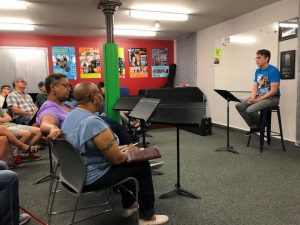 Last night I had the immense pleasure of giving my annual college talk at Jazz House Kids. The organization calls this “Jazz House Kids goes to college – part I” and offers it to all of our high school juniors and seniors and their parents. I started doing this about 5 years ago after my son, Julian, with lots of parental assistance, successfully managed his entrance to The Juilliard School. Helping Julian with all of his applications, navigating all the various deadlines, applying for financial aid, and negotiating for more scholarship than was initially offered, was one of the most stressful endeavors of my life. This being our oldest child, it was our first experience of this entire process and we frankly felt bewildered and overwhelmed by the task. Once we were through this very complex process and had succeeded in achieving our goal I decided to try to pass on our hard won knowledge to the next class of parents, and have done so each year since then.
Last night I had the immense pleasure of giving my annual college talk at Jazz House Kids. The organization calls this “Jazz House Kids goes to college – part I” and offers it to all of our high school juniors and seniors and their parents. I started doing this about 5 years ago after my son, Julian, with lots of parental assistance, successfully managed his entrance to The Juilliard School. Helping Julian with all of his applications, navigating all the various deadlines, applying for financial aid, and negotiating for more scholarship than was initially offered, was one of the most stressful endeavors of my life. This being our oldest child, it was our first experience of this entire process and we frankly felt bewildered and overwhelmed by the task. Once we were through this very complex process and had succeeded in achieving our goal I decided to try to pass on our hard won knowledge to the next class of parents, and have done so each year since then.
While my experience as a parent is the most important of my qualifications, I have also helped many other private students and Jazz House participants with their successful applications to Juilliard, Manhattan School of Music, Berklee, William Paterson, Northwestern, University of Miami, Rutgers, Oberlin Conservatory, and other schools. Additionally, as an adjunct professor at Montclair State University, I have been part of the process of auditioning and recruiting high school students to our program. And yet with all this experience I still don’t hold myself as an “expert” on the topic, but at least I can help parents and prospective students with a list of good questions to ask. Every year, I am asked questions that make me think about the topic in new ways and I’m usually given some useful information from the parents in the audience who have gone through this with an older child.

The general topics covered last night were:
- Determining which schools are best for you
- What schools are looking for in a prospective student
- Developing a college requirement spreadsheet
- Prescreening audition tapes
- Live audition preparation and timelines
- Scholarship and financial aid
Here are some important tips from my workshop:
- Even the most conscientious, organized, dutiful student needs HELP navigating this process. It’s overwhelming, it requires reminders of multiple deadlines for EACH school. Set up reminders in a calendar app that will keep you on track with all of the dates for submission. If you apply to 8 schools (a recommended number) and they each have 5 due dates to track, that’s 40 dates to remember.
- Make a spreadsheet. It will have about 10 columns with all the deadlines: deadline for university application, deadline for music school application (yes many schools require separate applications), deadline for pre-screening, submission, deadline for scheduling interview/school visit, financial aid deadline, FAFSA deadline. Additional columns will contain contact info for the admissions department, Director of Jazz Studies, instrumental teacher contact, tune requirements, and more.
- Don’t take on huge debt. I cannot imagine starting life as a musician with a quarter million dollars of school debt. Go where they give you money.
- Grades and test scores don’t have a huge influence on your admittance to a music school but may have a huge influence on non-music related funding available at a school. Universities usually have extra scholarships for high academic achievers.
- All the advice we parents get about the importance of our children having a wide range of extra-curricular experience and community service doesn’t matter to music schools. I have found that these activities only detract from a music school applicants main job in high school – practice!!!
- The most important thing a student needs to do to get into music school and receive scholarship is to practice. 3 to 4 hours a day minimum and hopefully even more than that when possible.
- Narrow your pre-screening audition tape tune list to as few as possible to fulfill the requirements of all schools. Use your spreadsheet to figure out which tunes are necessary.
- Hire young professional musicians to play on your audition tape. I know your friends are the greatest, but intros, endings, and other details are learned well only from EXPERIENCE and are going to be essential to making you sound your best.
- Hire a producer for your session. Your private teacher or another trusted mentor can help manage how many takes of each tune are necessary and help keep the session flowing.
- You don’t know what the auditioner is looking for. Play pretty, play soulfully, – you are probably not going to “impress” a college professor but you may turn one off by playing your hottest new lick and sacrificing time or artistic flow to do so.
- The Financial aid process will kick your butt. It’s like filling out another tax return. Get advice and assistance from your financial advisor and accountant starting now and get all your ducks in a row. This is not the year you can file an extension.
- Take each application and audition seriously. Even if you really don’t want to go to a particular school – the scholarship they offer you may work as a bargaining chip to get the scholarship you need from your first choice.
- Scholarships are negotiable.
- Schools don’t like to offer scholarships to students they think are not going to accept them. When negotiating make it clear to your first choice school that they are your first choice and if you receive the requested scholarship you will commit.
- Don’t tell a school they are your first choice when they’re not, but you don’t need to advertise that you’ve got another favorite. Once you have accepted an offer from one school, let any other schools know that you are going elsewhere – this releases the other schools from any scholarship money they offered you and they can then offer that money to another student.